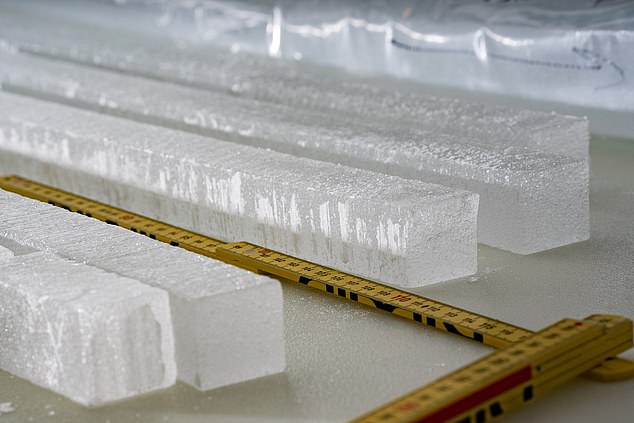Were the Romans STUPID? Lead pollution caused widespread IQ declines across the empire, controversial research claims
It was one of the most technologically advanced empires in history.
But according to a study, the Romans may have suffered from cognitive decline due to pollution.
Researchers suggest that widespread lead pollution – caused by mining – lowered the IQ of virtually the entire European population at the time.
For their research, the team from the Desert Research Institute in Nevada examined ice cores: ice columns up to 3,400 meters long that are extracted using enormous drills.
Gas bubbles trapped in the ice provide insight into the atmosphere of past eras, while the presence of pollutants such as lead can be used to indicate industrial activity.
Analysis of three ice cores showed that European lead emissions occurred around 15 BC. increased sharply due to the rise of the Roman Empire.
They remained high for about 150 years until the empire began to decline.
Combining their findings with current research linking lead exposure to cognitive decline, the scientists estimate that lead pollution during this period would have resulted in an average increase in blood levels in children of about 2.5 micrograms per deciliter.
It was one of the most technologically advanced empires in history. But according to a study, the Romans may have suffered from cognitive decline due to pollution

For their research, the team from the Desert Research Institute in Nevada examined ice cores: ice columns up to 3,400 meters long that are extracted using enormous drills.
As a result, this would have led to widespread cognitive decline of 2 to 3 IQ points across the Roman Empire.
“This is the first study to take a pollution record from an ice core and invert it to determine atmospheric concentrations of pollution and then assess human impact,” said Joe McConnell, lead author of the study.
“The idea that we can do this as early as 2,000 years ago is quite new and exciting.”
Ancient lead pollution was largely the result of silver mining, when the lead-rich mineral galena was smelted to extract silver.
Much of this lead subsequently entered the atmosphere.
In adults, high lead exposure is associated with infertility, anemia, memory loss, cardiovascular disease, cancer and a reduced immune response.
Meanwhile, in children, even low levels of exposure have been linked to reduced IQ, concentration problems and reduced academic success.
“Lead is known to have a wide range of effects on human health, but we chose to focus on cognitive decline because we can put a number on it,” said co-author Nathan Chellman.

Gas bubbles trapped in the ice provide insight into the atmosphere of past eras, while the presence of pollutants such as lead can be used to indicate industrial activity

Combining their findings with current research linking lead exposure to cognitive decline, the scientists estimate that lead pollution during this period would have resulted in an average increase in blood levels in children of about 2.5 micrograms per deciliter. Pictured: Grass-covered hills mark the site of the Roman-era lead mine at Charterhouse on Mendip
‘An IQ reduction of 2 to 3 points does not seem like much, but if you apply that to almost the entire European population, that is quite a bit.’
Although ice core data show that lead pollution in the Arctic was 40 times higher in the early 1970s – at its peak – the study shows how “humans have been influencing their health through industrial activity for thousands of years,” the team said.
Their findings were published in the Proceedings of the National Academy of Sciences (PNAS).
